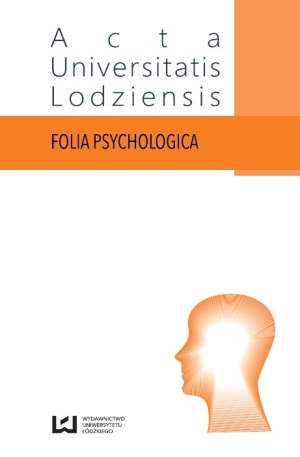PRÓBA STWORZENIA TYPOLOGII LUDZI STARYCH NA PRZYKŁADZIE OSÓB KORZYSTAJĄCYCH Z DZIENNYCH DOMÓW POMOCY SPOŁECZNEJ
A TYPOLOGY OF OLDER PEOPLE – RESEARCH ON A SAMPLE OF DAY CARE HOME RESIDENTS
Author(s): Monika JankowskaSubject(s): Psychology
Published by: Wydawnictwo Uniwersytetu Łódzkiego
Keywords: elderly; life span development approach; care needs; relations with close persons; social activity; life satisfaction
Summary/Abstract: The issue undertaken in this essay focuses on the matter of life satisfaction of older people. The purpose was to create a typology of older people with the use of independent variables (the care needs; the goodnees of relations with close persons; social activity) and characterize the types by especially quality of life indicators – whole and current life satisfaction (dependent variables). Socioecological health model and a life span development approach were the theoretical base of the study. The research was conducted in day care homes in Poznań on a sample of 84 vounteers – elderly day care home residents. The following trial set of questionnaires have been completed by the investigated group: Questionnaire of Personal Details and RANaF (Relations, Activity, Care Needs and their Fulfilment) Questionnaire both made by author and Life Satisfaction Scale. Cluster analysis was made in this research. Four main types of older people were distinguished: 1) family; 2) socially passive; 3) compensatory and 4) socially active type. To sum up, findings of the research have led to following conlusions: 1) relations with close persons and social activity is a significant predictor of current life satisfaction of elderly day care home residents: a) social activity has no significance for current life satisfaction of younger elderly, if their relations with close persons are satisfying, b) social activity in conjuction with relations with close persons are significant predictors of current life satisfaction for older elderly; 2) good relations with close persons and high social activity perform a protective function of pathological aging process: a) high social activity is connected with lower care needs and greater independence in activities of daily living in the group of older elderly; 3) subjective health status is a secondary predictor of life satisfaction, considering relations with close persons and social activity as a prime predictors of current life satisfaction.
Journal: Acta Universitatis Lodziensis. Folia Psychologica
- Issue Year: 2009
- Issue No: 13
- Page Range: 75-102
- Page Count: 28

